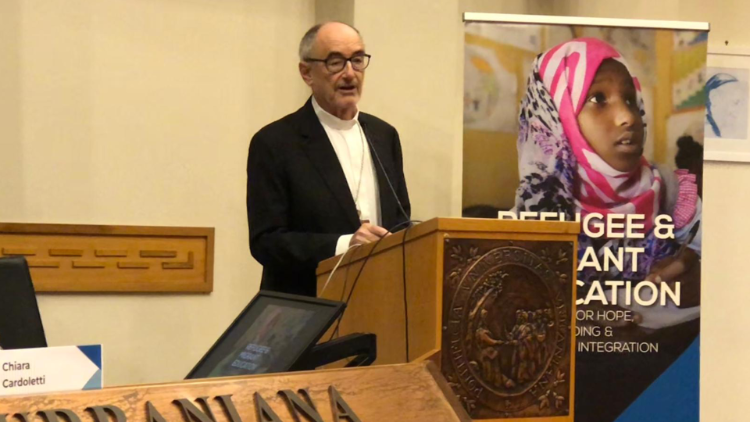
Pathways to inclusive education: A call for humanity-centered learning
By Svitlana Dukhovych and Linda Bordoni
The event, entitled “Refugee and Migrant Education. Pathways for Hope, Understanding & Meaningful Integration” takes place from 6 to 8 November, thanks to the joint effort of the Refugee & Migrant Education Network, Jesuit Refugee Service, Scalabrini International Migration Institute, John Carroll University, and Villanova University’s Strategic Initiative for Refugees and Migrants.
The conference, which brings together professors, UN agencies, faith-based organizations, humanitarian groups, and migrant and refugee students to discuss innovative educational practices, foresees participation in panels and workshops designed to promote mutual understanding and facilitate integration efforts for refugees, migrants, and displaced persons.
Fostering collaboration
Speaking to Vatican News’ Svitalana Dukhovych, Anthony Cernera, president and co-founder of the Being the Blessing Foundation, reflected on the conference's mission.
He noted that “The Refugee and Migrant Education Network was started in 2018 with a primary goal of creating a network of universities, NGOs, and individuals committed to the education of migrants and refugees.”
Now, he said, the network has over 2,500 members who receive updates on events and developments, including periodic webinars and, every two years, an international conference such as this one.
“Our aim is to foster collaboration among individuals and institutions dedicated to refugee education,” Cernera continued, “Education is a critical tool for a better life, and it empowers young refugees to contribute to their new societies.”
Cardinal Michael Czerny, Prefect of the Dicastery for Promoting Integral Human Development and a key speaker at the conference, underscored the importance of creating an educational framework that reaches beyond practical skills to foster a deep sense of humanity and belonging among refugees and migrants.
“Educational programs need to design educational processes that focus on social infrastructure, the building and strengthening of community bonds, within a given educational institution and beyond," he said in his speech. "Our institutions need to become hubs of cultural, linguistic, and religious diversity where the educational goals of the institution help the students and their families to begin to locate themselves, their hopes, and aspirations.”
A network of networks
Dr. Tina Facca-Mies of John Carroll University also spoke about her experience within the network.
She told Vatican News that she joined in 2018 after being invited by JRS to discuss the importance of keeping refugee girls in school.
“It was a very moving experience that engaged me immediately,” she recalled, adding that “This network brings together a variety of perspectives, creating meaningful collaborations.”
Facca-Mies highlighted that the goal of the conference is to build further connections. “We are a network of networks,” she said. “Through workshops and discussions, we’re exploring ways to collaborate more effectively.”
She also spoke about the impact on students and the importance of teaching about forced migration.
“Seeing the impact of talking and teaching about refugees motivates us to dig deeper,” she explained, and with the global number of displaced people rising, she emphasized the need to address the causes of forced migration, educating a new generation on how to foster change.
Pope's recommendations
Reflecting on last year’s meeting with Pope Francis, Facca-Mies expressed how his words have shaped the network’s mission.
“We took his recommendations seriously and integrated them into our strategic plan,” she noted, explaining that the Pope’s encouragement of “social promotion” resonated with the network, reinforcing the commitment to welcoming, integrating, and advocating for others.
“Advocating for refugees and equipping them with tools to advocate for themselves is something we can all contribute to,” she added.
Facca-Mies highlighted a recent initiative at John Carroll University, where students can earn graduate-level credits while conducting research with refugee and migrant peers.
“This social innovation research lab fosters a global classroom where students learn from each other,” she explained, adding that the programme not only provides refugees with academic credit but also equips them with skills for entrepreneurial success.
“Through this network,” Facca-Mies concluded, “we are building bridges for a more inclusive and understanding society.”
Thank you for reading our article. You can keep up-to-date by subscribing to our daily newsletter. Just click here








